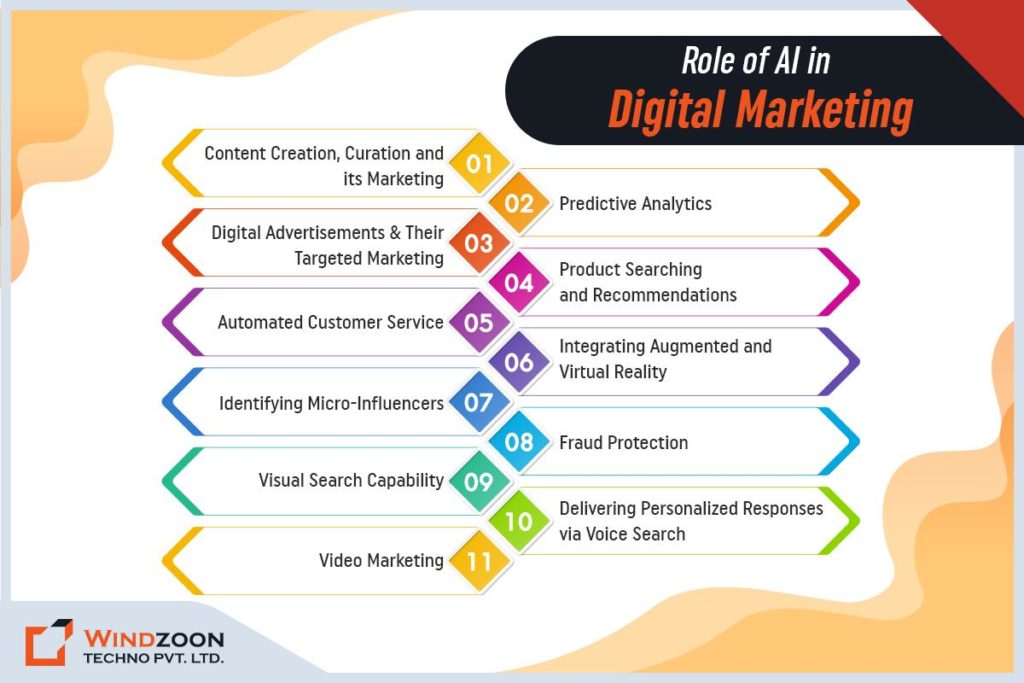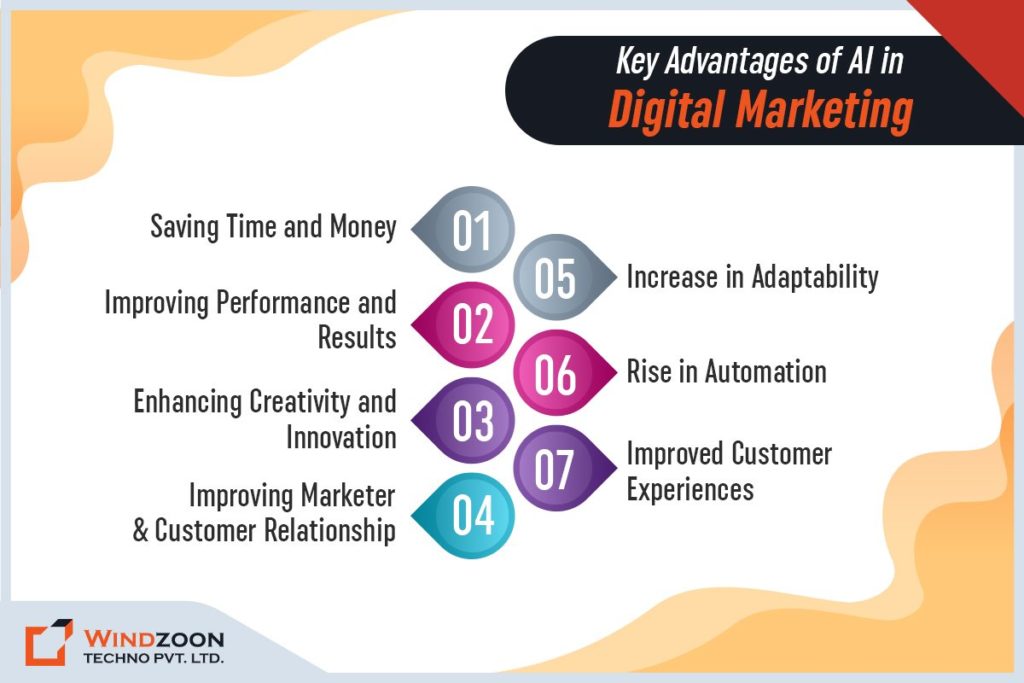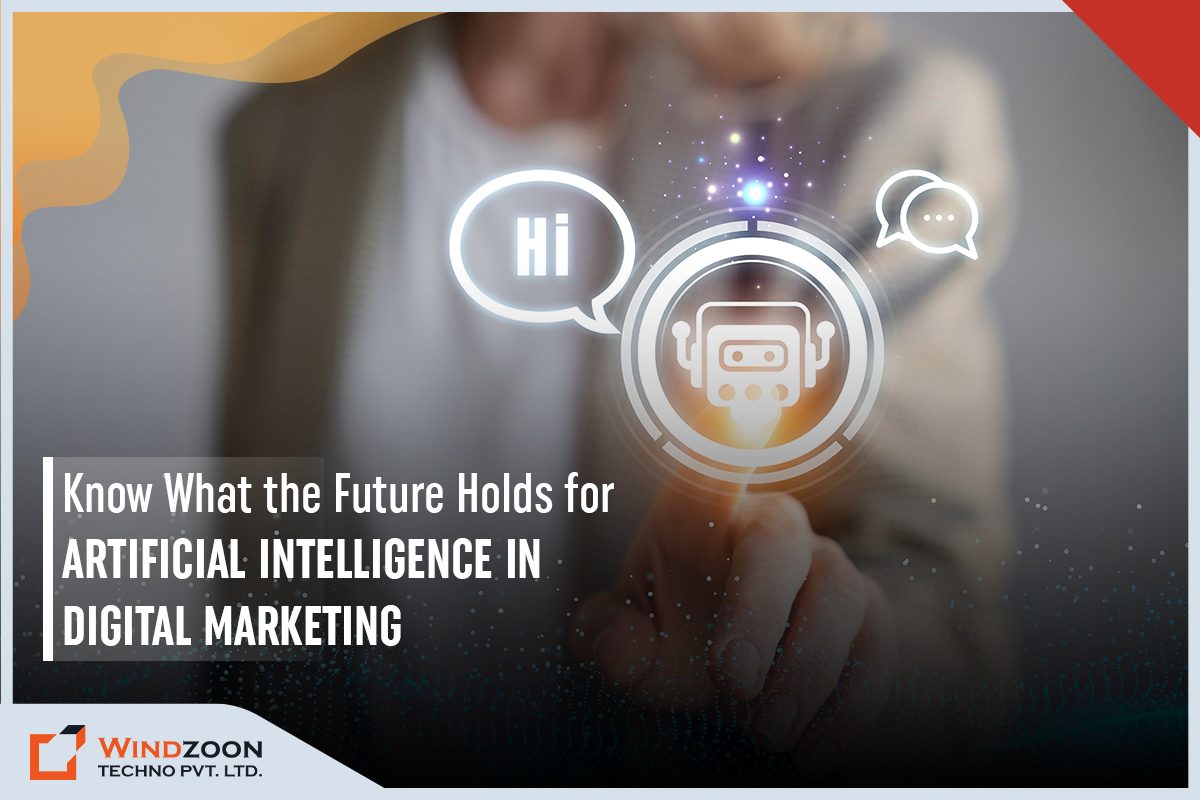The grand entry of ChatGPT has successfully made AI (artificial intelligence) the talk of the town. Before, it was just a topic for deep discussion among technocrats, scientists and thinkers. But now, it has become a subject of intrigue and concern for even the ordinary people.
The reason is; that the advancement of technology has led to AI saturating every industry and working field. One such industry is digital marketing. The incorporation of artificial intelligence (AI) in digital marketing has transformed the way businesses communicate with their consumers, personalize experiences, and optimize campaigns for optimal efficiency.
As per Statista, the market for artificial intelligence (AI) in marketing was projected around 15.84 billion dollars in 2021. The same source reveals that, by 2028, the value will be increased to above 107.5 billion dollars.
In this blog post, we’ll look at the incredible influence of AI in digital marketing. In addition, learn how collaborating with a digital marketing agency in India or the USA may help you redefine strategy, improve customer interaction, and pave the road for a more effective and data-driven future with AI.
- What is Artificial Intelligence?
- Role of AI in Digital Marketing Services
- Examples of AI’s Role in Digital Marketing Services
- Content Creation, Curation and its Marketing
- Predictive Analytics
- Digital Advertisements & Their Targeted Marketing
- Product Searching and Recommendations
- Automated Customer Service
- Integrating Augmented and Virtual Reality
- Identifying Micro-Influencers
- Fraud Protection
- Visual Search Capability
- Delivering Personalized Responses via Voice Search
- Video Marketing
- Benefits of AI in Digital Marketing Services
- Significant AI Tools for Digital Marketing Services
- Wants to Leverage AI-Enabled Digital Marketing Services?
What is Artificial Intelligence?
Artificial Intelligence, commonly known as AI, is akin to a highly intelligent computer brain. This advanced technology enables computers and machines to think, learn, and tackle problems much like humans do. It does so by processing data – both historical and current – to make informed decisions without human intervention.
Remember when you’re playing a video game and the characters you play against seem to think and make decisions on their own? That’s AI in action. Or when you talk to Siri or Alexa, and they understand you and respond, that’s also AI.
AI’s applications are vast and varied. It powers self-driving cars, allows smartphones to recognize faces, and even enables chatbots to assist customers efficiently. In essence, AI is like having a really clever helper that can process lots of information quickly and help us in our daily lives.
Now, let’s learn about the role of artificial intelligence in digital marketing.
Role of AI in Digital Marketing Services
When we talk about the role of Artificial Intelligence (AI) in digital marketing, it is like a highly intelligent partner that assists businesses in efficiently reaching and engaging with a larger online audience.
To know it better, here is an example, when you’re shopping online, AI analyzes your previous purchases and browsing habits. It’s as if the website ‘remembers’ what you like, suggesting new products that align with your interests.
Additionally, AI excels in crafting compelling advertisements designed to grab the attention of the right audience. Its ability to process vast amounts of data enables businesses to understand their customers better. AI can identify the likelihood of a product appealing to different demographic groups, such as a 20-year-old woman or a 50-year-old man. This helps businesses to do more targeted and effective advertising.
Furthermore, AI-powered chatbots on websites offer instant assistance to customers. They answer their queries in no time, thereby enhancing customer service and experience.
Moreover, AI in digital marketing is about leveraging advanced technology to accurately showcase products to the appropriate audience, create more engaging ads, and deliver prompt and efficient customer service.
Examples of AI’s Role in Digital Marketing Services

Following are some routine AI in digital marketing examples:
1. Content Creation, Curation and its Marketing
Artificial Intelligence (AI) is revolutionizing the field of content creation by automating routine tasks and enabling the generation of personalized content on a large scale. Natural Language Generation (NLG) algorithms, such as ChatGPT and BARD, are at the forefront of this change. They can produce various forms of content including blog posts, product descriptions, and social media updates, all while adhering to specific brand guidelines and catering to audience preferences.
In addition to content creation, AI plays a crucial role in content curation. AI-powered tools are adept at navigating the vast sea of online content to pinpoint relevant and trending topics. These tools are not just limited to content discovery; they also aid in determining the most suitable type of content for different platforms and the optimal timing for distribution. This ensures that the content reaches the intended audience effectively and efficiently.
Furthermore, in the realm of AI-driven content marketing, these technological advancements extend to providing data-driven insights and feedback to content creators. By establishing a continuous feedback loop, these tools empower marketers to refine their content creation strategies continuously. They can track and analyze their performance relative to competitors, paving the way for enhanced content quality and more successful marketing outcomes.
2. Predictive Analytics
The use of AI-driven predictive analytics has revolutionized the process of generating and nurturing leads. AI excels in sifting through millions of social media trends and posts, identifying patterns in text, images, and hashtags. Through this analysis of historical data, AI algorithms are capable of pinpointing potential customers with a higher likelihood of conversion. This enables marketers to concentrate their resources on more promising leads.
Additionally, AI is adept at anticipating customer behaviors, such as the likelihood of them discontinuing service, known as churn. This predictive capability allows for preemptive actions to maintain customer loyalty. This adaptability is crucial for marketers to respond to changing market dynamics, ultimately boosting the brand’s performance as new data unfolds.
3. Digital Advertisements & Their Targeted Marketing
Aside from assisting marketers in reaching the correct audience, AI in digital marketing brings up a plethora of chances for businesses to construct new ad campaigns across platforms such as Google, Facebook, and Instagram. These platforms examine user data, including gender, age, interests, demographics, and other personal characteristics, to deliver the optimal experience.
AI ensures, for instance, that people who have been searching for bicycles online get more advertisements for bicycles or riding gear rather than irrelevant items like lawnmowers in their search results.
Targeted Marketing allows AI algorithms to ensure that the user receives the most relevant adverts, therefore boosting the performance of the digital ads provided.
Here, since you are paying for each ad that is shown to a user, you have the choice of who sees your adverts. To provide personalized client experiences, you must first anticipate different consumer categories and include smart designs in digital marketing campaigns.
4. Product Searching and Recommendations
Artificial intelligence improves the accuracy of finding things that customers wish to purchase and presents recommendations for those products. AI-powered product recommendations help consumers locate the products they want to buy.
This is like a friendly store associate who can recall everything you’ve ever liked or purchased. When you look for products online, AI leverages your previous searches and purchases to suggest other items you might be interested in.
On the other side, the right AI tools allow digital marketers to make more accurate and timely forecasts about which things people will purchase. This boosts sales and allows firms to showcase products to potential buyers who have previously decided that they are worthwhile and efficient.
5. Automated Customer Service
Artificial intelligence facilitates automated customer service. It encompasses tasks like sending out messages, providing automated responses through chatbots, delivering results from surveys, and responding to inputs on various online platforms.
Chatbots, powered by AI, are a prominent example of this technology in action. They have revolutionized customer support by offering immediate assistance to users around the clock.
These AI-driven virtual assistants are capable of handling standard inquiries, supplying information about products, and assisting customers throughout their purchasing journey.
Equipped with Natural Language Processing (NLP), chatbots can comprehend and interact with human language, creating a smooth and individualized conversation experience. This level of automation not only conserves time and company resources but also ensures uniformity in customer service across multiple channels.
6. Integrating Augmented and Virtual Reality
Artificial Intelligence (AI) is set to significantly boost the development of Virtual Reality (VR) and Augmented Reality (AR) in the coming years. This emerging marketing approach is outshining traditional methods like billboards and print advertisements.
By blending the virtual world with real-world settings, it offers customers an entirely new and engaging experience. AR, in particular, opens the door to limitless immersive experiences.
Imagine offering interactive product demonstrations or transporting customers directly into your store through virtual showrooms. AR is the key element in transforming standard marketing efforts into extraordinary, memorable journeys.
Hence, prepare to amaze your customers as they interact with your brand in unprecedented ways. Remember, the future of marketing transcends mere product selling; it’s about crafting unforgettable experiences.
7. Identifying Micro-Influencers
This is about finding the right people online to promote products. Micro-influencers are like mini-celebrities on social media; they have fewer followers than big stars but are often more connected to their audience.
AI helps businesses find these micro-influencers. It looks at data like who’s talking about certain topics or products and how people respond to them. This way, businesses can partner with the right micro-influencers who fit with their brand and will appeal to their target customers.
8. Fraud Protection
AI in digital marketing services is like a digital security guard. It helps protect online transactions from fraud. AI systems can learn to spot unusual patterns, like if someone tries to buy a lot of things in a very short time or from a different country than usual.
This can signal a fraudulent transaction. By identifying these patterns, AI can alert the business and help prevent fraud, making online shopping safer for both the business and the customers.
9. Visual Search Capability
Visual search technology, driven by AI algorithms, enables consumers to search using images instead of text or keywords. This advanced search method allows users to find items online by simply using pictures. Google Lens stands as a prime example of this AI-powered Visual Search Capability in the digital marketplace.
This technology is particularly beneficial for those who may not know how to accurately describe what they are looking for, or for those who are not familiar with the specific vocabulary of an item. Consequently, visual search offers a practical solution, bypassing the challenges people encounter when they input incorrect terms in a search bar.
10. Delivering Personalized Responses via Voice Search
Voice recognition technology, like Alexa playing music or Siri setting alarms, is gaining global popularity. Marketers must recognize the importance of optimizing websites for voice search, as this shift underscores its growing significance.
Artificial Intelligence enables devices to understand and respond to voice commands using natural language. Have you come across Machine Translation Post-Editing? This advanced technology combines native translators’ expertise to create accurate multilingual content that effectively communicates marketing messages, all while minimizing errors. In digital marketing, AI is paving the way for swift conversion of content into multiple languages, catering to diverse customers.
Furthermore, companies can now obtain immediate insights into customer interactions across various communication channels. Backend teams can use this information to automatically route issues to the right support group and employ statistical models to identify the most effective next steps.
11. Video Marketing
Videos have emerged as a potent tool for disseminating knowledge and information. In the past year, there has been a significant surge in video consumption, particularly in live-streaming content.
In response to this trend, businesses are increasingly leveraging artificial intelligence to enhance the effectiveness of their video marketing strategies. AI aids companies in gaining deeper insights into their consumers’ viewing patterns, helping them understand customer behavior, provide tailored content, and ultimately, increase the Return On Investment (ROI) of their video content.
All the digital marketing applications discussed are integral to the Real-Time Optimization approach in ongoing marketing strategies, setting a foundation for automated sales predictions. Future advancements in AI will further enable businesses to operate at optimal profitability, elevate sales, and make adjustments based on concrete data.
Benefits of AI in Digital Marketing Services

Here are some of the significant advantages of Artificial Intelligence in Digital Marketing.
- Saving Time and Money: AI streamlines marketing processes, automating tasks that humans usually perform. This automation saves considerable time and reduces costs, as AI can handle tasks like data analysis and customer service inquiries quickly and efficiently.
- Improving Performance and Results: AI’s ability to analyze vast amounts of data helps businesses make more informed decisions. It can predict customer trends and preferences, leading to more effective marketing strategies and better results in terms of sales and customer engagement.
- Enhancing Creativity and Innovation: AI provides marketers with new tools and insights, sparking creativity. It can suggest content ideas, design layouts, and even help in creating personalized marketing messages, pushing the boundaries of traditional marketing.
- Improving Marketer and Customer Relationship: AI helps in personalizing customer interactions, making them more meaningful. By understanding customer behavior and preferences, AI enables marketers to communicate with customers more effectively, building stronger relationships.
- Increase in Adaptability: With AI, marketers can quickly adapt to changes in the market or consumer behavior. AI’s real-time data analysis helps businesses stay agile and responsive to new trends or customer needs.
- Rise in Automation: Automation in digital marketing, powered by AI, includes everything from automated email campaigns to chatbots handling customer service inquiries. Due to this efficiency, businesses can concentrate on more strategic responsibilities.
- Improved Customer Experiences: AI enhances the customer experience by providing personalized recommendations, quick responses to inquiries, and more engaging content. This tailored approach makes customers feel understood and valued, increasing their loyalty to a brand.
Significant AI Tools for Digital Marketing Services
The following are 19 AI marketing tools you need to try in 2024:
- Jasper AI: For copywriting
- Surfer SEO: For SEO content writing
- Content at Scale: For generating SEO blog posts
- Originality AI: For detecting AI-generated content
- Writer.com: Content writing tool for teams
- FullStory: For analyzing digital experiences
- Zapier: For automating various tasks
- Hemingway App: For editing and improving content
- Chatfuel: For creating chatbots
- Grammarly: For content editing and grammar checking
- Albert.ai: For digital advertising
- Headlime: For designing landing pages
- Userbot.ai: For managing conversations
- Browse AI: For web page scraping
- Algolia: For search and recommendation APIs
- PhotoRoom: For removing backgrounds from images
- Reply.io’s AI Sales Email Assistant: For managing email replies
- Brand24: For media monitoring
- Influencity: For influencer marketing
Wants to Leverage AI-Enabled Digital Marketing Services?
The incorporation of AI in digital marketing is poised to alter the industry, increasing the effectiveness and efficiency of marketing efforts while providing improved customer experiences. With fresh and fascinating advancements anticipated in the upcoming years, artificial intelligence in digital marketing has a bright future.
To take advantage of this bright future, you will need the help of a next-gen AI-enabled digital marketing company that helps businesses grow and thrive in the digital world.
We at Windzoon offer innovative AI-enabled digital marketing services to scale up our clients’ businesses. Our team of professional digital marketers love going above and beyond to achieve our clients’ goals.
Hence, don’t wait any longer; contact us now to get a quote and leverage our services.





 +91 9904713335
+91 9904713335
